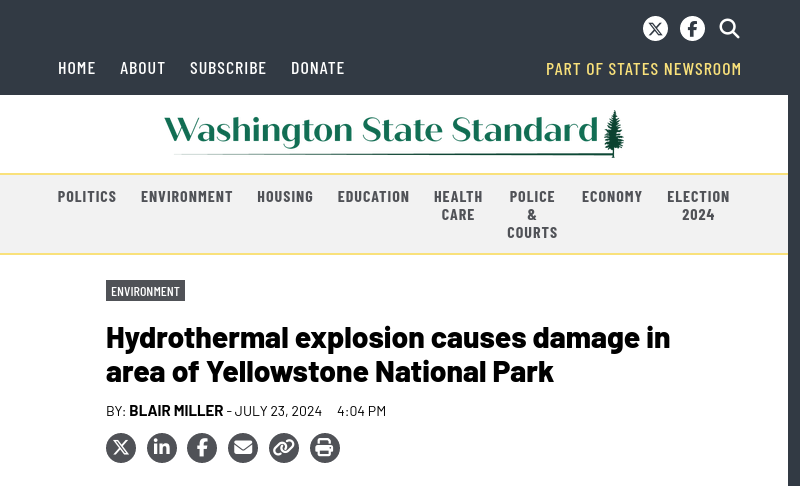you have the possibility to publish an article related to the theme of this page, and / or to this region:
United States - -An information and promotions platform.
Links the content with your website for free.

United States - Web content about Yellowstone

Yellowstone National Park officials are investigating after a hydrothermal explosion occurred in Biscuit Basin on July 23, 2024.
The explosion damaged a boardwalk and sent debris several stories into the air.
According to Michael Poland, the scientist-in-charge at the U.
S.
Geological Survey’s Yellowstone Volcano Observatory, the explosion was considered 'small' and happened around 10 a.
m.
about 2.
1 miles northwest of Old Faithful, likely in the Black Diamond Pool in Biscuit Basin.
No injuries have been reported so far.
Videos taken by witnesses showed several people on the boardwalk close to where the explosion occurred, with debris scattered across the area and a damaged boardwalk.
Biscuit Basin’s parking lot and boardwalks are temporarily closed for safety.
Yellowstone National Park geologists are investigating the explosion but have stated that monitoring data shows no unusual volcanic activity.
Poland emphasized that today's explosion does not indicate any changes within the volcanic system, which remains at normal background levels of activity.
Hydrothermal explosions like this one are relatively common in Yellowstone National Park.
Previous explosions occurred in Biscuit Basin in May 2009 and in Norris Geyser Basin on April 15.
Porkchop Geyser in Norris Geyser Basin exploded in 1989.
These explosions often send boiling water, steam, mud, and rock into the air and can reach heights of up to 1.
2 miles.
Large hydrothermal explosions happen on average every 700 years, and at least 25 craters in the park are at least 328 feet wide.
Although large hydrothermal explosions are rare on a human timescale, the potential for future events in Yellowstone National Park is not insignificant.
Based on the occurrence of large hydrothermal explosion events over the past 16,000 years, an explosion large enough to create a 100-meter (328-ft) wide crater might be expected every few hundred years.
The National Park Service noted that Black Diamond Pool erupted black, murky water following an earthquake in July 2006 and saw 'several explosive eruptions' in the days after, though eruptions have been infrequent since then.
Its average temperature is 148.
5 degrees Fahrenheit.
The public affairs office for Yellowstone National Park referred to the news release from the Yellowstone Volcano Observatory and said no further information was immediately available.